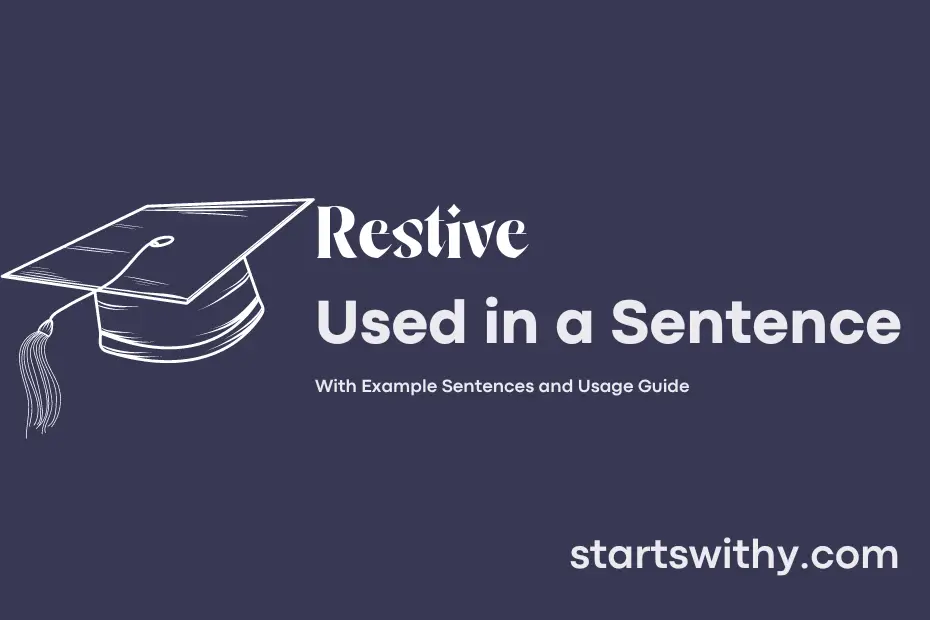Have you ever come across the word “restive” and wondered what it means? In simple terms, “restive” describes a feeling of impatience, unease, or defiance in a situation.
This adjective is commonly used to portray a sense of restlessness or resistance, often in circumstances where someone feels constrained or frustrated.
7 Examples Of Restive Used In a Sentence For Kids
- The little horse was restive on the farm.
- The children were restive during the story time.
- The dog became restive when its owner left for work.
- The kitten was restive and kept running around the house.
- The students were restive before the school bell rang.
- The baby elephant was restive and wanted to play all day.
- The squirrel was restive and couldn’t sit still for a moment.
14 Sentences with Restive Examples
- Restive students were eagerly waiting for the professor to announce the exam results.
- Many college students tend to feel restive during long lectures on theories.
- The group of friends grew restive as they waited in line for their chance to register for the popular course.
- The student council members became restive as they discussed various ideas for the upcoming event.
- The students grew restive as they realized the deadline for the project submission was fast approaching.
- Restive students crowded the library during exam week, trying to find a quiet place to study.
- The students were getting restive as they waited for the bus to arrive for their college trip.
- The class grew restive as the professor continued to extend the duration of the lecture.
- The students appeared restive as they listened to a guest speaker talk about career opportunities after graduation.
- Some students became restive during the group project discussions, wanting to move forward quickly.
- The students were restive as they anxiously awaited the results of the campus elections.
- The students were becoming restive as the wifi connection in the college campus began to slow down.
- The students grew restive as they tried to navigate the complex process of choosing elective courses for the semester.
- The students became restive as they waited for the college authorities to make a decision on conducting the annual fest.
How To Use Restive in Sentences?
Restive is a versatile word that can be used in various contexts to describe feelings of impatience, unease, or resistance. To use Restive in a sentence, it is essential to understand its meaning and correct placement within the sentence.
Here is a simple guide on how to use Restive in a sentence:
-
Meaning: First, understand that the word Restive typically means feeling restless, impatient, or unwilling to remain inactive. It can be used to describe either a person or a situation that is uneasy or tense.
-
Placement: In a sentence, Restive is commonly used as an adjective to describe a noun. It usually precedes the noun it is describing to provide more information about the state or behavior of that noun.
-
Example Sentences:
- The students grew restive as the teacher continued to delay announcing the test results.
- The restive crowd began to murmur discontentedly as they waited in line for the concert to start.
- The horse became restive during the storm, pawing at the ground nervously.
By following this guide, you can effectively incorporate Restive into your sentences to convey feelings of unease, impatience, or resistance. Remember to place it correctly in the sentence and consider its meaning to ensure clear communication.
Conclusion
In conclusion, the sentences with the keyword “restive” highlight a sense of unrest, impatience, or uneasiness. The word “restive” is often used to describe individuals or situations that are resistant to control or confinement. These sentences illustrate a state of restlessness, defiance, or agitation that can be found in various contexts, such as with restless animals, impatient crowds, or rebellious characters. Through these examples, the meaning of “restive” becomes clear as a term conveying a sense of resistance or disobedience, adding depth and complexity to the descriptions provided.
By examining sentences containing the keyword “restive,” one can grasp the nuanced nuances of the word, understanding its implications of defiance and unease. Whether describing a tense situation, a rebellious character, or an animal resisting restraint, the use of “restive” evokes a sense of tension and dissatisfaction. This word enriches language by capturing the essence of resistance and unrest in a concise and impactful manner.



